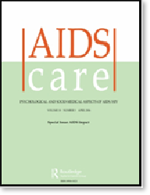A first-of-its-kind University of Pennsylvania study found that the Transcendental Meditation (TM) technique can help improve vitality and other quality-of-life factors in patients with the HIV virus.
The six-month, randomized controlled trial involved 22 subjects and compared the TM technique with a health education control. Findings were published online in the journal AIDS Care: Psychological and Socio-medical Aspects of AIDS/HIV. The TM group was found to have a significant improvement in health-related quality of life in areas such as the ability to be physically and socially active, pain, general mental health, vitality, and general health. The study group also had improved physical, social, and emotional wellbeing.
A range of physiological measures, such as the hormone cortisol, which is associated with stress, and T-cell count, which is a measure of immune function, found that in every case the TM group had better outcomes than the control group, though the results didn’t achieve statistical significance.
Stress has been implicated in the pathogenesis and progression of HIV/AIDS
Over the past 50 years, researchers have become increasingly interested in how stress causes and/or contributes to disease. Many scientists believe there are two likely pathways. One is behavioral—people under stress sleep poorly and are less likely to exercise; they adopt poor eating habits, smoke more and don’t comply with medical treatment. The second is physiological—stress also triggers a response by the body’s endocrine systems, which release hormones like cortisol that influence multiple other biological systems, including the immune system.
Since 2000 results of research on the relationship between stress and HIV/AIDS have consistently demonstrated a link between stress and the progression of AIDS, according to Carnegie Mellon University psychologist Sheldon Cohen. Dr. Cohen’ research, published in the Journal of the American Medical Association (JAMA), found that the impact of stress may have become more pronounced in AIDS patients in recent years because of the complex and demanding drug regimen that patients now undergo. He said stress may tax their ability to keep up with their treatment. The researchers also noted that changes in the autonomic nervous system caused by stress may also contribute to disease progression by influencing the replication of the HIV virus.
The current research at the University of Pennsylvania on the effects of the Transcendental Meditation program on those with AIDS was based on the extensive body of research showing the daily practice of TM technique reduces stress levels.
Dr. Sumedha Chhatre of the University of Pennsylvania’s Center for AIDS research was the study’s lead author. Dr. David Metzger, Director of the HIV/AIDS Prevention Research Division of the Perelman School of Medicine at the University of Pennsylvania, Department of Psychiatry, was the principal investigator.
“This is the first study to explore application of TM in community dwelling adults with HIV and adds to the existing evidence regarding association between stress and outcomes,” said Dr. Sumedha Chhatre.
The researchers think that the positive results of this initial study will lead to further research involving larger-scale, longer-term studies.
The study was funded by a grant from the University of Pennsylvania’s Center for AIDS Research (CFAR).





